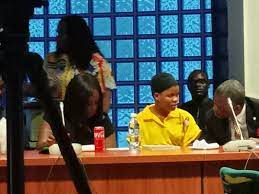
In an intriguing turn of events, the House of Representatives in Abuja recently held a special hearing to discuss the case of Mmesoma Ejikeme, an Anambra State pupil who had been caught manipulating her results in the Unified Tertiary Matriculation Examination (UTME). Mmesoma, a teenager with previously high aspirations, had inflated her score from 249 to a whopping 362, falsely placing herself as the top scorer in the 2023 UTME.
Despite the initial denials and blame-games with the Joint Admission and Matriculation Board (JAMB), Mmesoma confessed to her wrongdoing and submitted an apology to the examination board for her misconduct. The confession followed a series of accusations and counter-accusations that saw JAMB impose a three-year ban on Mmesoma. This provoked heated debates among stakeholders and led to the intervention of the House of Representatives, who called for a pause on the sanction.
Eventually, under the scrutiny of a Commission of Inquiry established by the Anambra State Government, Mmesoma Ejikeme owned up to falsifying her results. The House of Representatives also launched an ad hoc committee to further probe into the case, further intensifying the controversy surrounding the teenage girl.
During her appearance before the ad hoc committee, Mmesoma Ejikeme presented a plea for mercy, imploring JAMB to reconsider the three-year ban placed on her. She expressed deep remorse for her actions, stating, “I feel a debt of pain for letting you down. I have already admitted that what I did was wrong. Based on that, I hereby present to you all, my letter of apology.”
Mmesoma attributed her decision to ignorance, admitting that she had procured the counterfeit result from a different portal rather than the official JAMB site. Her tearful apology encapsulated her remorse and regret for all the trouble and pain she had caused.
However, her plea for mercy was met with steadfast opposition by the JAMB Registrar, Prof. Ishaq Oloyede, who was present at the hearing along with top officials of the examination body. Prof. Oloyede maintained that Mmesoma Ejikeme’s forgery was not an act of ignorance, but a deliberate and calculated conspiracy with others. He disclosed that JAMB had taken stringent action against exam malpractices, closing over eight UTME centres found guilty of results manipulation.
The Mmesoma Ejikeme saga sheds light on the relentless efforts by examination bodies and lawmakers to uphold integrity in Nigeria’s educational system, and is a stern reminder of the repercussions faced by those who attempt to undermine it. Whether Mmesoma Ejikeme’s remorse will lead to a reduction in her penalty remains to be seen, but her story serves as a cautionary tale for other students contemplating similar actions.














